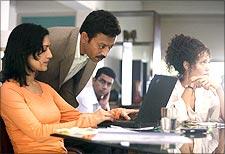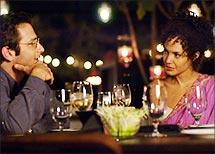Last week, Angelina Jolie came to New York City to attend the premiere of British director Michael Winterbottom's A Mighty Heart and also to promote the film with the press who was desperate to hear words of wisdom from Hollywood's most sought after celebrity.
Jolie spoke to Larry King, Jon Stewart and several other reporters. But I never got the interview of my lifetime.
This is how the story unfolded.
On the day Jolie arrived for the film's premiere, Fox News broke the story that the star's lawyer Robert Offer had sent out a letter to media outlets asking them to sign a contract that they would not ask her any personal questions.
Several outlets refused to sign the contract and Fox News, AP, USA Today decided not to interview Jolie. On Friday afternoon when I arrived at the Waldorf Astoria hotel to attend A Mighty Heart press day, reporters from ABC Radio and MTV Radio also mentioned to me that they had refused to sign the contract.
With all the bad press she was getting last week, Jolie set the record straight on the Stewart show. The letter, she said 'was from my representative trying to be protective of me, but it was excessive and I wouldn't have put it out there.'
That response was appropriate, given that A Mighty Heart condemns people who would like to suppress the freedom of press. Offer then told The New York Times that the contract should be blamed on a 'bone-headed, over jealous lawyer.' He was referring to himself.
 When the Friday roundtable interviews started, I was aware of these reports. But I also knew that I had not received the e-mail, letter or contract from Offer's office. Maybe that should have been a sign for things to come.
When the Friday roundtable interviews started, I was aware of these reports. But I also knew that I had not received the e-mail, letter or contract from Offer's office. Maybe that should have been a sign for things to come.
At the start of the roundtables, we were given the order of the talent interviews by Paramount Vantage's 20-something publicist. As with most Hollywood press roundtables, the publicists bring one talent after another to rooms, occupied by eight to ten journalists.
First, Dan Futterman (who plays Daniel Pearl, The Wall Street Journal's South Asia bureau chief) was going to visit our room followed by Jolie, Irrfan Khan and finally Archie Punjabi.
Since I arrived earlier than other reporters in my room, I placed myself right next to where the talent would be seated thus giving me the advantage of getting in more questions. And, of course, the fan in me would be able to ogle at Jolie, and stare at every mole, blemish and freckle on her face.
The interview with Futterman went off rather well. The actor and Oscar-nominated scriptwriter for Capote was candid about his career struggles. Like most roundtables, the interview lasted 20 minutes, after which Futterman was ushered out and we all braced for Lady Jolie to make her presence in our room.
And that is when it happened.
One of the publicists I had worked with, asked me to step out. I left my tape recorder and my bag in the room, hoping to be back in a couple of minutes.
When I stepped out, I was given this piece of information: Jolie's publicists had not approved my name and so I could not interview the star. I was to stay out of the room for the entire duration when Jolie was going to talk in the room where I was supposed to be seated.
A whole range of emotions went through my mind -- shock, dismay, anger, frustration and then confusion. I tried to argue, saying that there were other reporters in my room who had not signed the contract sent out by Jolie's lawyer. But that did not get me anywhere. I thought I could play the race card, but there were two African American reporters in the room with me. And they were not pulled out.
Perhaps I was the only South Asian reporter in the room. Maybe that was the issue. But didn't Jolie spend a month in India shooting A Mighty Heart? And wasn't India good to her? And didn't Danny and Mariane Pearl love their stint in South Asia, especially Mumbai, until the day he was kidnapped in Karachi?
I could have argued that I have been covering cinema for a couple of decades and interviewed world renowned filmmakers from Satyajit Ray to Bernardo Bertolucci and Costa Gavras, and famous actors such as Richard Gere, Glenn Close and Amitabh Bachchan. But none of this cut any ice with the 20-something white, clueless, recent college graduate in charge of approving the list of reporters who could interview Jolie.
 I may be good enough for ABC News' Nightline and Good Morning America (who invited me to comment on the infamous Gere-Shilpa Shetty kissing controversy) but here, I was not good enough to be seated next to Jolie at a roundtable about an American journalist who worked out of Mumbai and was beheaded in Pakistan.
I may be good enough for ABC News' Nightline and Good Morning America (who invited me to comment on the infamous Gere-Shilpa Shetty kissing controversy) but here, I was not good enough to be seated next to Jolie at a roundtable about an American journalist who worked out of Mumbai and was beheaded in Pakistan.
Anyway, I let it go. There was no time to argue. Jolie was already doing the interview and in less than 20 minutes, she would move to another room. I drank coffee and nibbled on the dessert spread that Paramount's publicity department had laid out for the press.
And soon, I saw the back of Jolie's blond hair, as she was escorted to the next roundtable room. I was sent back to my room, where Irrfan Khan had just started to talk to the other reporters.
I did not get to sit right next to Jolie, but I will have one exciting story to tell my grandchildren. At the premiere of A Mighty Heart, most of the South Asian reporters were seated in the front section of the Ziegfeld Theatre. Before the film began, Jolie along with the rest of the cast came and sat down. And so for a few minutes, we were able to stare at the Hollywood beauty who was seated in our midst.
We stared at Jolie dressed in a black dress, blond hair tied in a bun, as she smiled and chatted with Khan and Punjabi, who were seated behind her. And we saw a very handsome and smiling Brad Pitt who was also there just a few seats away from Jolie.
We became fans and took pictures with our cell phones all the while marveling at our opportunity to be so close to a 32-year-old super mom, whose slim body is full of tattoos, and who once wore a vial of blood around her neck.
I did not get my interview, but I am not angry with Jolie. She is too beautiful for that.





